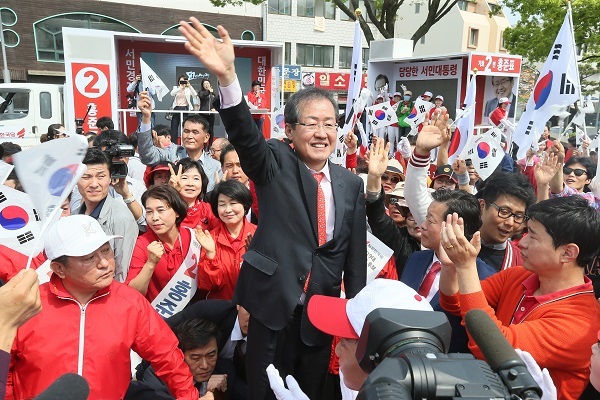In South Korea’s presidential election, an enigmatic candidate is fast emerging, aiming to duplicate what Donald Trump has done in the United States.
Hong Joon-pyo, a star prosecutor-turned conservative firebrand, sparks controversy on his campaign trail about every other day -- from his alleged complicity in a sexual assault attempt to his sexist and homophobic remarks and a pledge to revive the death penalty.
Yet, his support rising. Recent surveys from six major research firms give the candidate of the Liberty Korea Party support ratings of between 15 and 20 percent, closely chasing second-placed Ahn Cheol-soo of the centrist People’s Party.
Hong Joon-pyo, a star prosecutor-turned conservative firebrand, sparks controversy on his campaign trail about every other day -- from his alleged complicity in a sexual assault attempt to his sexist and homophobic remarks and a pledge to revive the death penalty.
Yet, his support rising. Recent surveys from six major research firms give the candidate of the Liberty Korea Party support ratings of between 15 and 20 percent, closely chasing second-placed Ahn Cheol-soo of the centrist People’s Party.

The gap between Hong and Ahn was 1-7 percentage points, narrowing from the previous week.
Moon Jae-in of the liberal Democratic Party of Korea is the clear front-runner with 39 to 46 percent support.
Behind Hong’s seemingly enigmatic rise is the consolidation of conservative voters, who earlier in the race were largely divided over who to support, experts say.
After former UN Secretary-General Ban Ki-moon and acting President Hwang Kyo-ahn renounced their rumored ambitions for the presidency, right-leaning voters were floating between the centrist Ahn and several conservative candidates.
In recent weeks, however, Hong, with his ultraconservative vision and unrefined rhetoric, has succeeded in gaining popularity especially among those residing in the Daegu-North Gyeongsang Province area, the political home turf of jailed former President Park Geun-hye and her Saenuri Party, which has rebranded itself as the Liberty Korea Party.
Senior conservative voters in particular are actively supporting Hong, who resigned from his post of South Gyeongsang Province governor for the presidential race.
Though Hong still lagged behind Moon in Daegu and North Gyeongsang Province by 9 percentage points, his support among those in their 50s in the region reached 38.8 percent, according to a Realmeter poll. Both Moon and Ahn’s support was at 20-22 percent.
The issue is whether Hong can draw support from conservatives in southern Seoul, Busan-South Gyeongsang Province, Gangwon Province and the Chungcheong provinces -- ousted Park and former President Lee Myung-bak successfully did so in 2012 and 2007, respectively.
In the past four TV debates, Hong has tried to appeal to right-wing voters by highlighting North Korea’s nuclear threat and the policy failures of the liberal Kim Dae-jung and Roh Moon-hyun administrations. He continuously denounced Moon for having an “unstable” national security philosophy.

Despite a certain level of success in pulling up his support, political watchers still share the view there is a limit in widening his support base. They mostly cite the Park Geun-hye scandal, which has hung over the nation since last October.
“His strategy to divide between (liberals and conservatives) is politically meaningful,” Myongji University professor Shin Yul said. “But he has yet to appeal to voters who are ashamed of having cast ballots for Park.”
Kyonggi University adjunct professor Kim Hong-kook cited the high proportion of swing voters, 20-30 percent, for the projection of Hong’s real votes in the May 9 election.
“Aside from loyal conservative voters, there are moderate conservatives among those supporting candidate Hong,” Kim said. “It seems that many of the moderate conservatives -- involving center-right voters -- do not trust his morality.”
Kim hinted that the swing voters, mostly composed of moderate conservatives or centrists, could make a strategic choice to block Moon from being elected. This means a large portion of the moderates would forgo their support for Hong and cast ballots for Ahn.
As far as Moon is concerned, the dispersion of conservatives’ votes been Ahn and Hong could be the best-case scenario.
By Kim Yon-se (kys@heraldcorp.com)


![[Exclusive] Korean military set to ban iPhones over 'security' concerns](http://res.heraldm.com/phpwas/restmb_idxmake.php?idx=644&simg=/content/image/2024/04/23/20240423050599_0.jpg&u=20240423183955)

![[Graphic News] 77% of young Koreans still financially dependent](http://res.heraldm.com/phpwas/restmb_idxmake.php?idx=644&simg=/content/image/2024/04/22/20240422050762_0.gif&u=)



![[Pressure points] Leggings in public: Fashion statement or social faux pas?](http://res.heraldm.com/phpwas/restmb_idxmake.php?idx=644&simg=/content/image/2024/04/23/20240423050669_0.jpg&u=)









